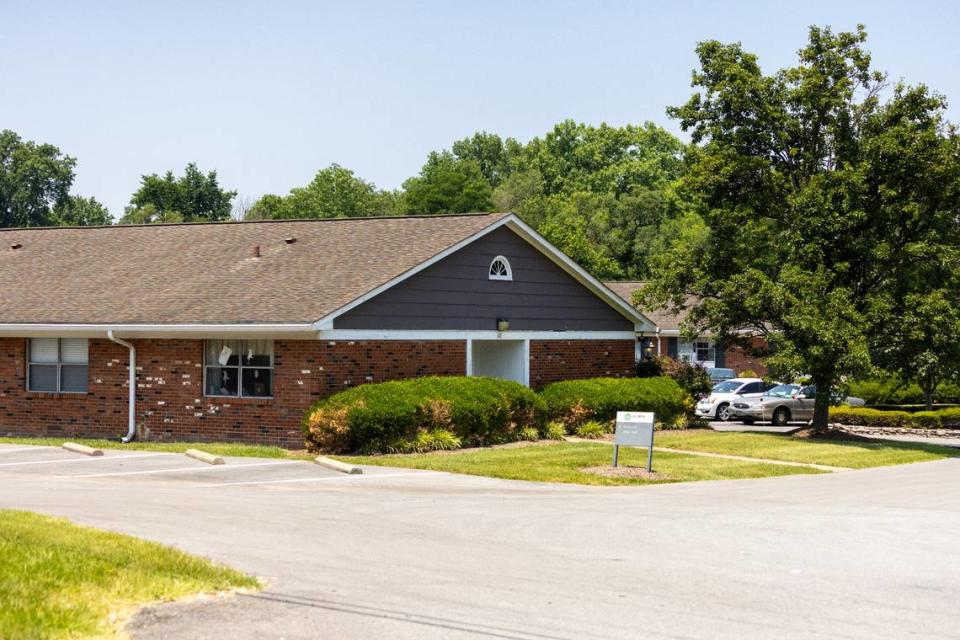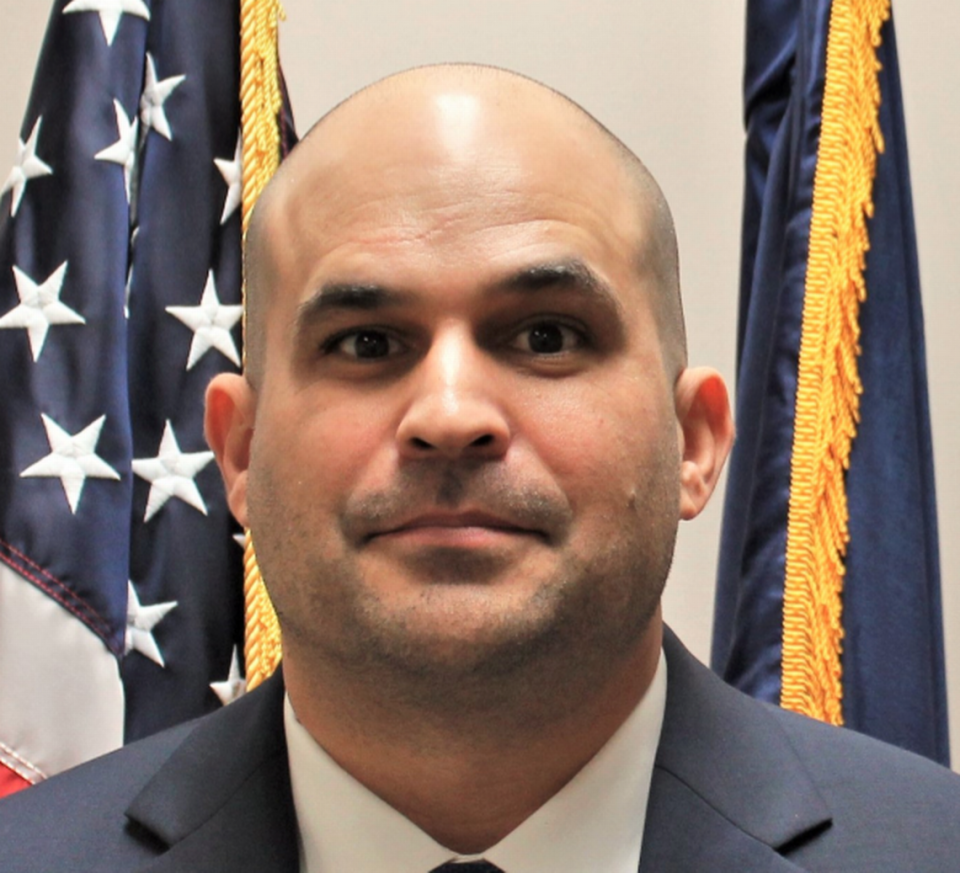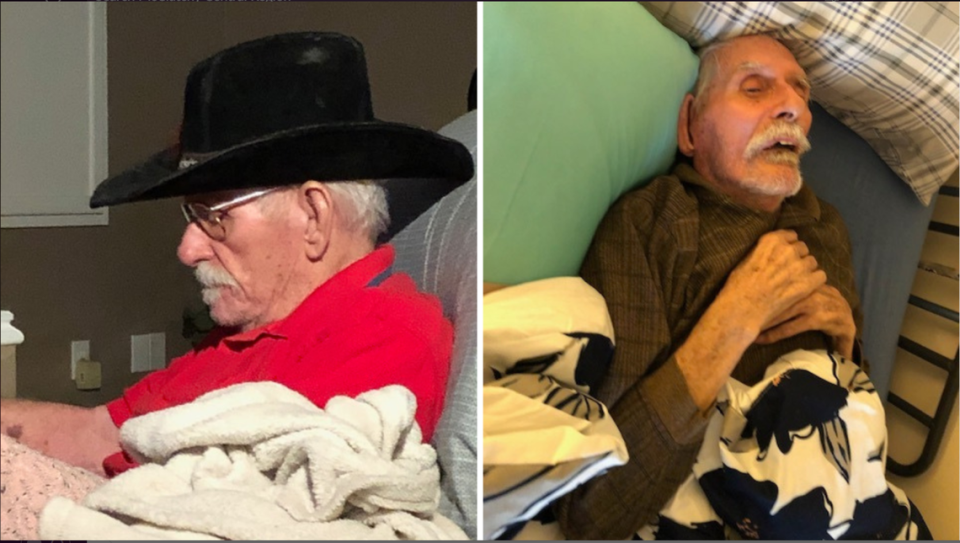‘Do they not care?’ Kentucky faces huge backlog of nursing home inspections
Last September, a small team of inspectors from the Kentucky Cabinet for Health and Family Services went looking for problems at a Louisville nursing home called Hillcreek Rehabilitation and Care.
They found plenty.
According to inspectors’ reports, which eventually led to Hillcreek being shut down this summer and fined $636,752, the 120 elderly and ailing residents suffered through a rodent infestation, filthy living conditions and an unacceptably poor standard of care.
“A Hillcreek employee punched a resident in the groin after the resident’s family requested through a grievance that the employee be kept from the resident due to prior harassment,” prosecutors wrote in a motion for the federal government when Hillcreek tried in vain to preserve its Medicare and Medicaid funding.

However, this isn’t a success story about the state health cabinet triumphing in its watchdog role.
Just the opposite: Inspectors should have been inside Hillcreek, uncovering its rats and filth, much earlier.
The U.S. Centers for Medicare and Medicaid Services, known as CMS, essentially funds the American nursing home industry. In 2022, CMS and the states pumped $94 billion into more than 15,000 nursing homes.
To monitor the quality of this care, CMS requires states to conduct annual inspections of facilities. This multi-day process, known as a “standard survey,” employs a team of nurses and other medical specialists. Inspectors are supposed to catch problems early, before they get serious enough for residents to be hurt, sickened or killed.
But because of a dangerous shortage of inspectors — the worst in the United States, according to one report — Kentucky hasn’t reliably performed standard surveys since the COVID-19 pandemic shut down the state in spring 2020.
As of June, according to a CMS database of nursing home quality information, 73 percent of Kentucky’s 277 nursing homes were listed as going more than two years without a so-called “annual” inspection. That’s far worse than the national two-year backlog average of 11 percent, according to the CMS database.
(This data is never entirely up-to-date, CMS told the Herald-Leader in July. There is generally a delay of two to four months before CMS posts the results of state surveys to its nursing home database, the federal agency said. Also, the same staff shortage that contributed to a huge inspection backlog in Kentucky is slowing the pace at which the state uploads its survey results to the database, CMS said.)
Hillcreek, which already was one of the lowest-rated nursing homes in the state because of past problems, went three-and-a-half years without a standard survey, from February 2019 to September 2022, according to CMS and court records.
Kentuckians should be horrified, said Theresa Hutchins of Louisville.
Hutchins is suing Hillcreek for wrongful death and corporate negligence over the 2021 death of her uncle, whom she said was starved to the point of emaciation during his stay at the facility. Hers is one of a dozen similar lawsuits that Hillcreek has faced in the last few years.

“I can’t imagine, if I drove up to a fast-food restaurant and I saw the little sign saying that it last passed the local health department inspection three or four years ago, that I’d want to eat there,” Hutchins said. “But that’s what we’re getting with our nursing homes.”
Lengthy delays between inspections mean scant oversight at long-term care facilities, typically owned by for-profit corporate chains and where many thousands of vulnerable Kentuckians live every day.
The delays also erode the accuracy of Nursing Home Compare, the quality rating website run by CMS. It’s based largely on state inspections. Families consult this website before picking a nursing home for their loved ones. They are referred to it by the state health cabinet and respected experts at AARP and the National Institute on Aging.
Even before the current inspection backlog, Kentucky nursing homes had among the worst collective ratings in the country. In 2018, 43 percent were rated “below average” or “much below average” by CMS.
“It’s really terrifying,” said Toby Edelman, senior policy attorney with the Center for Medicare Advocacy in Washington.
“You would think that at the very least, if the state had this massive a backlog, that it would prioritize the very worst nursing homes and make sure that it was getting to them — the one-star facilities, the ones cited for abuse, the ones known to over-prescribe anti-psychotic drugs to keep their residents docile,” Edelman said.
“But that doesn’t seem to be what’s happening here, and I don’t understand it. They have so much information coming in to them — who has the worst staffing, who isn’t staffed on weekends — and they’re not using it,” she said. “Do they not care?”
In May, the Herald-Leader requested interviews for this story with Kentucky’s health secretary, Eric Friedlander, and one of Friedlander’s subordinates, Inspector General Adam Mather, a former nursing home executive whose office oversees nursing home inspections across the state.

The health cabinet declined to make the officials available for interviews. The cabinet also declined to answer most written questions the newspaper submitted over the next two months about Kentucky’s nursing home inspection backlog and the reasons for it.
In a brief statement, health cabinet spokeswoman Susan Dunlap said the cabinet acknowledges an inspection backlog has been created in Kentucky since the pandemic. She said the state is working to address it by raising salaries for inspectors in an effort to boost hiring and retention.
Hillcreek and its owner, Lexington-based Exceptional Living Centers, declined to comment for this story. The company continues to operate 25 nursing homes across Kentucky and six other states.
So-called ‘annual’ inspections
Federal rules don’t give the states much wiggle room. CMS requires inspectors to perform a standard survey at each nursing home in their state every nine to 15 months, with a statewide average of 12 months.
However, the rules are largely toothless. In a federal inspector general’s report in 2022, CMS admitted it seldom imposes financial penalties on states that fail in their inspection duties, saying that would only further stress their public health budgets.
And CMS has never terminated any state’s agreement with the federal government to conduct nursing home inspections on behalf of CMS, the report said. So states can keep falling short, the inspector general concluded.
“When states fail,” the inspector general wrote, “nursing home residents may be at increased risk for poor care.”
That’s what happened in Louisville. Hillcreek’s last standard survey before its current troubles was in early 2019.
That survey found a number of serious deficiencies, including unsanitary living conditions and failure to report an abuse complaint. Hillcreek also disclosed a greater use of anti-psychotic drugs on its residents than the statewide average and considerably lower levels for nurse staffing.
In a court filing this spring, Hillcreek said 41 months passed before its next “annual” inspection in September 2022. That was the standard survey that led to its eventual closure, although the end did not come for nearly another year due to a series of months-long delays by the health cabinet and, finally, Hillcreek’s appeal, the facility said.
There is great value in inspectors doing the long days of legwork involved in a standard survey every year, said Sherry Culp, Kentucky’s state long-term care ombudsman.

Culp oversees a statewide network of advocates for nursing home residents, with the authority to tour facilities and speak with residents and their families about the quality of treatment being provided.
“It is concerning to us that (state inspectors) are so far behind,” Culp said.
“These surveys are important,” she said. “To have trained health care professionals go in and review a sample of medical records, observe how care is administered, see how the food is prepared, talk to the residents and the staff, walk the halls — that’s just so valuable.”
“You do not want to go two or three years without this and let things get worse because you’re not in there looking.”
Sluggish response time
During the intervals between standard surveys, inspectors sometimes conduct a “complaint survey,” a more focused visit to look at a specific grievance about care that can be filed by residents, their families or others.
At present, Kentucky’s health cabinet is “focused heavily on complaint surveys ... recognizing the importance of investigating allegations of resident/patient harm,” said Dunlap, the cabinet spokeswoman. In a statement, CMS confirmed that it has “prioritized” complaint surveys for the states since the start of the pandemic.
However, it can take two to three years for complaint surveys to work their way through their own separate backlog, said nurse Barbara Lear, a Kentucky nursing home inspector who quit last summer.
By the time inspectors finally arrive at a facility to investigate an old complaint, Lear said, residents involved in the case likely have died, and the employees no longer work there and might not want to speak to state officials about the allegations.
“That was a big part of our job, just trying to track down the people who used to work there and, if we can find them, trying to get them to talk to us,” Lear said.
Experts say another problem with forgoing standard surveys in favor of complaint surveys is that standard surveys are proactive, intended to prevent a bad outcome, while complaint surveys are reactive, done to determine how a bad outcome occurred.
They compared the practice to a local health department responding to food poisoning cases at restaurants rather than regularly inspecting the kitchens to look for poor hygiene practices.
“By the time you’re doing a complaint survey, the mistake has already been made and the harm has been done. Wouldn’t it be better to catch the mistakes before they happen?” Edelman asked.
Inspectors went to Hillcreek three times in 2020 to investigate complaints about poor resident care or accident hazards, according to CMS.
In one of those cases, a resident was found after falling out of bed with an emergency call cord wrapped around the neck. The resident was unresponsive, eyes bugging out, according to the inspection report. Staff resuscitated the resident. Hillcreek pledged to make safety improvements.
But as Lear indicated, Kentucky also is grappling with a backlog of complaint surveys.
State records show that last year, Kentucky inspectors received more than 1,700 of the most serious kinds of complaints, classified as “immediate jeopardy,” up from about 1,000 in 2018.
The percentage of complaint surveys started in the “federally required time-frame” — within a matter of days — fell from 85 percent to less than 4 percent during this period.
Some people say they get no satisfaction when they call state inspectors to report complaints.
Marla Carter is suing the Owensboro nursing home where her mother-in-law lives, Chautauqua Health and Rehabilitation, alleging that inadequate staffing and medical care led to serious health problems like dehydration, weight loss and infections.
Chautauqua, cited by inspectors for abuse in the past, has undergone only two standard surveys during the last five years, according to CMS.
The most recent annual inspection identified 19 deficiencies. Among them, inspectors said, staff failed to stop some residents from threatening, sexually harassing and physically assaulting other residents, leading to injuries, including a broken leg. CMS issued nearly $100,000 in fines.
Carter said she has emailed and called state inspectors to report her own concerns at the facility, such as mice in her mother-in-law’s closet. When the health cabinet responds to her at all, it says it can’t do anything, she said.
“I don’t know if they’re so frustrated and busy and overwhelmed that they don’t pursue violations or if they’re just not inclined to do that. But I do know from my own experience that people calling the state to report problems usually don’t even get a response,” she said.
“We have a lot of great regulations in place to protect our loved ones. The problem is, too much of the time, we don’t have anybody enforcing them. It’s very frustrating,” Carter said.
Chautauqua did not respond to a request seeking comment.
‘A system in crisis’
The inspection backlog isn’t confined to Kentucky nursing homes, even if the numbers are far worse here.
The pandemic gets much of the blame.
To curb the spread of the highly infectious COVID-19 virus, which killed many tens of thousands of nursing home residents and staff, CMS told states to focus on infection control surveys rather than standard surveys from spring 2020 to fall 2021.
By the time standard surveys resumed in 2021, state inspectors everywhere faced a logjam of catch-up work.
A Herald-Leader analysis of CMS data shows that Kentucky’s backlog of nursing homes more than two years overdue on standard surveys exploded during the year 2021 and reached a high of 77 percent in March 2022.
The U.S. Senate Special Committee on Aging released a report in May on a national shortage of nursing home inspectors and a backlog of standard surveys since the pandemic. It warned of “a system in crisis.”
“Nursing home residents are the people who ultimately suffer,” wrote the authors of the report, which was titled Uninspected and Neglected.
But most states caught up on their work faster than Kentucky did, federal officials noted.
As of May, 28 percent of the nation’s 15,000 nursing homes were legally overdue for a standard survey, having gone at least 16 months since the previous one, Erin Bliss, assistant inspector general at the U.S. Department of Health and Human Services, testified to the Senate subcommittee.
“By state, the backlogs range from less than 1 percent to as high as 87 percent, with Kentucky and Maryland each facing a backlog of 80 percent or greater,” Bliss told the senators.
Everyone should be upset about Kentucky’s oversight failure, said Theresa Hutchins, the Louisville woman suing Hillcreek over the 2021 death of her 87-year-old uncle, Joe Naegele.
“He wasn’t fed. He was starved,” Hutchins said. “He lost 20-something pounds in 30 days. I went there and I called every day and nobody did anything. Finally, I just pulled him out. I had no other choice. But he never recovered.”

Hutchins said she was angry when she learned that state inspectors did not make standard surveys of Hillcreek for several years, including during the time of her uncle’s stay.
Since 2021, Hillcreek has faced a dozen wrongful death and negligence lawsuits alleging a range of patient care deficiencies, from broken bones to bedsores. Most of the suits allege dangerous levels of under-staffing that put residents in harm’s way.
When the government closed Hillcreek this summer, it was too little, too late, Hutchins said.
“They should have been in there already,” she said.
“It infuriates me,” she said. “Because a lot of these seniors do not have anyone to go in there and speak on their behalf, to ask questions and make sure they get the kind of quality care they deserve. That’s what the state was supposed to be doing.”

